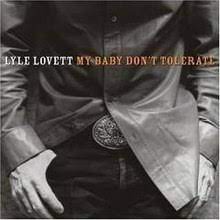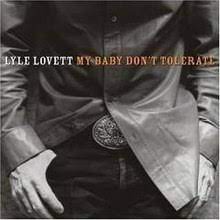LYLE LOVETT : MY BABY DON'T TOLERATE
- Cute As A Bug
- My Baby Don't Tolerate
- The Truck Song
- In My Own Mind
- Nothing But A Good Ride
- Big Dog
- You Were Always There
- Wallisville Road
- Working Too Hard
- San Antonio Girl
- On Saturday Night
- Election Day
- I'm Going To Wait
- I'm Going To The Place
Label : Lost Highway
Length : 56:52
Release Date : September 30, 2003
Review (AllMusic) : Lyle Lovett is many things, but prolific is not one of them. Yes, at the outset of his career, he released an album every year or two, but by the time he became a star in the early '90s, he slowed down quite a bit. Between 1992's Joshua Judges Ruth and 2003's My Baby Don't Tolerate, his first release on Lost Highway, he only released one album of new original material: The Road to Ensenada, in 1996, which followed 1994's I Love Everybody, a clearing-house of songs he wrote before his first album. So, My Baby Don't Tolerate is his first album of new songs in seven years, and two of its 14 songs - "The Truck Song" and "San Antonio Girl" - were previously released on 2001's Anthology, Vol. 1 (which is bound to frustrate fans that bought that uneven collection just for the new tunes), leaving this as a collection of 12 new songs. Given the long wait between albums and since the record is so firmly in the tradition of The Road to Ensenada that it could be branded a sequel, there may be an initial feeling of anticlimax, since there's not that many songs and they all feel familiar. Such is the complication of a long wait - it invariably raises expectations - but judged as a collection of songs against Lovett's other albums, My Baby Don't Tolerate holds its own very well. As mentioned above, it is very similar to The Road to Ensenada, sharing that album's clean, unadorned production, directness, and preponderance of straight-ahead country songs. And it's not just that the album is country; it's that many of his eccentricities are toned down, to the point that when Lovett ends the album with two gospel numbers, they sound like shtick. Even the handful of ballads are lighter, lacking the somber introspection of Joshua Judges Ruth or the subtleness of I Love Everybody. Everything here is out in the open, and it's the better for it; musically, it may offer no surprises, but its directness is appealing, particularly because Lovett simply sounds good singing country songs. And that's what My Baby Don't Tolerate offers - Lovett singing good country songs and sounding good. It's not a complicated pleasure, but it doesn't need to be, and after a long dry spell, it sure is nice to have a new collection of songs from this reliable songwriter.
Review (Wikipedia) : My Baby Don't Tolerate is an album recorded by Lyle Lovett and released in 2003. On Tolerate, Lovett favors his country side a bit more than his many other facets. While long-time fans were reportedly disappointed with the album's pop-flavored opening track "Cute as a Bug", many of the other songs demonstrated his strengths as a storyteller. Oddly, the album ends with two gospel songs with remarkably similar names, which some critics decried as an overly precious attempt at enforced quirkiness. Nonetheless, Tolerate garnered very positive responses and respectable sales figures.
Review (PopMatters) : The fiddle and piano lines that open Lyle Lovett‘s newest album, My Baby Don’t Tolerate, offer an immediate indication of what Lovett has in store for the listener this time out. The opening cut, “Cute As a Bug”, gets the eight-piece band swinging country-style, with Stuart Duncan’s fiddle giving way to a funky piano run by Matt Rollings and slick solos by Duncan and Paul Franklin on steel guitar. It’s big, rollicking sound, the essence of the best of modern country music while harkening back to Texas swing bands like Bob Willis and His Texas Playboys — that’s the table setter for this solid 14-song effort, his 12th album (including an anthology disc issued in 2001 and collection issued earlier this year of songs he recorded for the cinema). Lovett is a genre-bending cowboy, a singer and songwriter who revels in a mix of musical styles and who brings a literate sensibility to his lyrics. He is very much a country crooner, but owes a significant debt to the country-influenced singer-songwriters of the 1970s. And he mixes into his often funky brew strands of jazz, blues, R&B, roots rock, gospel and a host of other heartland musical styles. Stirring this mix, of course, is one of the most distinctive voices in music today, a comfortable baritone edged with a Texas twang. Lyrically, the new disc does not stand up to his earlier outings, though there are gems here a-plenty, and Lovett has mixed what are some magnificent ballads — in particular, “In My Own Mind” and “You Were Always There” — in among a stew of up-tempo tunes, closing with a pair of dancing-in-the-aisles gospel songs. “You Were Always There” is perhaps the best tune on the disc, a haunting song about loss and love, Lyle’s voice supported by Rollings’s delicious piano. “Now there’s no one left to guide me / Tell me now what I’m supposed to do / Oh what I’m supposed to do”. But there is no one to answer the singer, though reminders of the lost one are present everywhere. “I feel the wind blow”, he sings, “It’s rushing through my hair / Out in the shadows / Your face is everywhere”. And while “A new horizon / It’s all supposed to be” and there is “the voice of / Eternal hope and love” coming from above, there remains that emptiness, as the song fades on a pleading, repeating refrain — “You were always there”. “In My Own Mind” is a reflection on self, on the ability of one to find that place of calm within one’s self, “where I can breathe”. The song drifts back and forth between the tangible — morning coffee, the plowing of the fields, his hunting and fishing buddies, his wife “standing in the kitchen” — and his internal life, summed up in the chorus. “I live in my own mind”, he sings, “Ain’t nothing but a good time / No rain, just sunshine / Out here in my own mind”. While the ballads contain the lyrical punch, it is the up-tempo songs that add the exclamation point — particularly the two gospel shouts that close the disc, the powerful “I’m Going to Wait”, with its refrain of “I’m going to wait / Just a little bit longer / Until my Savior / He comes for me”, and “I’m Going to the Place”. On first listen, songs like “Cute As a Bug” or “San Antonio Girl” are rather lightweight, simple ditties that in someone else’s hands might go nowhere. But Lovett and his band play each song with a level of commitment and an intensity that should force even the most skeptical of listeners to just tap their feet and go with the flow. “Cute As a Bug”, as I said, opens with that short repeating fiddle and piano line and then jumps into a full band swing, a real country dervish that makes it easy to forget that this is a simple song about a man whose spirits are raised by the fleeting sight of a woman behind the wheel of a Volkswagen. The title cut is a bluesy, tongue-in-cheek paean to the singer’s lover, who apparently keeps the wayward singer in check. He knows “Some things / My baby don’t tolerate”, which is OK because “a smaller more ordinary man / Might not appreciate the guidance of a good woman / Who truly loves him”. The singer does, because “I’m proof that true love will / Set you free”. It’s not innovative music, not groundbreaking or trend setting, but it is passionate — which is what makes songs like “Cute As a Bug”, the title cut and the other up-tempo tunes such great fun to listen to. And that, ultimately, is what Lovett’s mission appears to be here, to get past all the baggage that weighs us down, to find that girl in the Volkswagen or that “San Antonio Girl” and take that “long drive / That gives him some peace of mind” as he waits for the Judgment Day.

